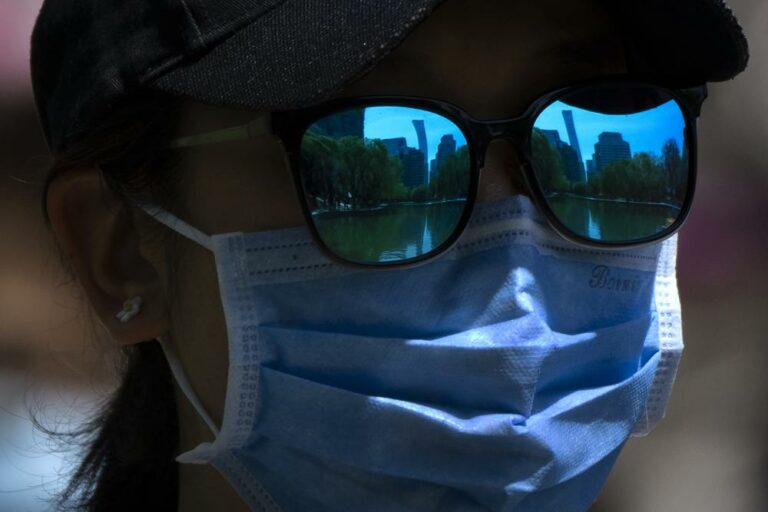A judge in northwest Spain has overruled a family’s objections and decided to allow health authorities to administer a coronavirus vaccine to an incapacitated woman in a nursing home.
The case appears to be the first known instance of a court in Europe requiring someone to get a COVID-19 vaccine. The Spanish government repeatedly has stressed that shots would be voluntary, as have authorities in other European countries.
In a ruling seen by The Associated Press on Wednesday, the judge for the court in the autonomous northwest community of Galicia recently ruled in favor of a request by a nursing home to override the refusal of the elderly resident’s family and to proceed with giving her the vaccine.
The resident was deemed by the medical staff at the nursing home to have suffered a cognitive loss to the extent that she “was incapacitated to provide valid consent,” according to the ruling.
Judge Javier Fraga Mandián said the court had the legal obligation to intervene in order to protect the woman’s health. He said his decision was not based on the welfare of other residents, but that the “existence of tens of thousands of deaths” from the virus in Spain provided what he saw as irrefutable evidence that not taking the vaccine was riskier than any possible side effects.
The company that runs the nursing home, DomusVi, told the AP through its public relations agency that out of all the homes it manages throughout Spain, this was the only case of a family not wanting to vaccinate a resident who had been deemed incapable of making personal health decisions.
DomusVi said that 98% of the 15,000 residents in its nursing homes in the country agreed to receive the vaccine. It said the remaining 2% refused to get vaccinated but unlike the woman are considered fit to make their own health decisions.
DomusVi said it sought the court’s intervention in the interest of the health of all the workers and residents at the nursing home residents and workers at the Galicia facility.
Spain has administered over 581,000 doses of the Pfizer-BioNTech vaccine since it was authorized by the European Union in late December. Spain is also set to roll out its first batches of the Moderna vaccine.
Health Minister Salvador Illa said Thursday that Spain is seeing “a very low rejection of the vaccine, almost anecdotal.”
Nursing homes in Spain and across Europe have been devastated by the coronavirus, which spreads quickly among the elderly and individuals weakened by preexisting medical conditions. Over 25,000 people with COVID-19 are estimated to have died in Spanish nursing homes since the start of the pandemic.
Other court cases over the non-voluntary administering of vaccines may be on the horizon.
In southern Spain, a state prosecutor said recently that any family members acting as legal guardians for incapacitated nursing home residents could lose their guardianship if they refused to give permission for their relatives to be vaccinated.
The Italian government approved decree las week to explicitly authorize hospital chiefs and individual doctors to express inoculation consent on behalf of patients who cannot do so themselves, including nursing home residents who are incapacitated and without a guardian to give consent for them.
The procedure requires doctors to submit written documentation to a judge, who has 48 hours to approve or deny the request.
Although nearly a dozen European countries have mandatory vaccination laws for diseases including polio, measles and diphtheria. The laws are seldom enforced by the courts, although a Belgian court in 2008 fined and sentenced two sets of parents to five months in prison for failing to vaccinate their children against polio.
Unlike the COVID-19 vaccines, which are still technically considered experimental, the vaccines required by law in Europe are established vaccines that have been used for decades.
The World Health Organization has previously said it does not recommend making vaccination against the coronavirus compulsory, fearing that could undermine public confidence in the available vaccines.
At a press conference last month, Dr. Kate O’Brien, who heads WHO’s vaccines department, said she thought it would be better if countries created “a positive environment” for immunization as opposed to mandates. But O’Brien acknowledged that it might make sense in some high-risk environments, such as hospitals, to require staff members and patients to receive vaccines.
Some ethicists said the court’s decision to mandate the woman’s vaccination was likely justified by her high risk for COVID-19, given that she lives in an elderly care home.
“The court has to look at the balance of probabilities, and if the woman is elderly, she has a far higher risk of dying from COVID than from a low-probability adverse event,” said Julian Savulescu, director of the Oxford Uehiro Centre for Practical Ethics at the University of Oxford.
He said that even in countries that don’t have mandatory vaccination laws, the state is obliged to protect people when those making decisions on their behalf may not be acting in their best interests.
“If you don’t vaccinate this woman and she dies of COVID, then people will be saying, ‘Why didn’t you protect her?’” Savulescu said.
(AP)












5 Responses
I’m a little disturbed by this. Those with cognitive/neurological issues( as well as some chronic diseases) are most at risk for adverse reactions. That doesnt matter? It’s interesting how previously, those who needed to “protected” by others getting the vaccine, are now the 1st ones who “need” to get vaccinated 1st. Anyone realize that the rules are being switched?
another despicable judge playing dictator
To Truthseeker1:
If you really seek truth, look a court had to make an objective decision for an elderly person that the benefits CLEARLY outweigh the risks of the COVID vaccine. And where are we? How can people just say “Well I don’t know,” when their lives hang in the balance. The mitzvah of Venishmartem (protecting our lives) requires us to make the right decision, the courts will not help us.
By the way, the FDA recommends that almost everyone over the age of 16 get vaccinated. How can we just ignore that?
Beit, theres truth to what your saying, and there is a real science to vaccines with good in it. At the same time I believe there is also information being witheld, which we may not see until it’s too late. I’ve been a witness to more then 1 horrific vaccine reaction, which affects people and their families long term as well. There are risks both ways, but forcing people without consent, while withholding alternative preventive modalities / prophylactic treatment (i.e. artemesinin, ivermectin, zinc, quercetin, maybe even antibodies as a preventative measure., etc) feels so wrong! On the one hand this vaccine can be great, on the other hand it’s an experiment. Forcing this without consent just feels wrong. Technically, all others who received the vaccine should be protected shortly after, so it’s highly unlikely she will even put others at risk!
Beit, one more thing, in regards to FDA suggestions, the conflict of interest with the FDA, pharmacueticals, and others is huge. While, I’m sure there are good people within the corrupted system, overall, the $ pocket is just as important if not more, then protecting the public.